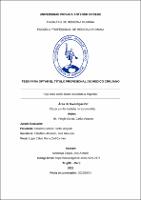Ojo seco como factor asociado a migraña

Ver/
Descargar
(application/pdf: 441.7Kb)
(application/pdf: 441.7Kb)
Fecha
2021Autor(es)
Yengle Garcia, Carlos Antonio
Metadatos
Mostrar el registro completo del ítemResumen
Objetivo: Determinar si el ojo seco es un factor asociado a migraña en
pacientes del hospital Belén.
Materiales y métodos: Estudio prospectivo, analítico de tipo transversal
realizado en el servicio de neurología del Hospital Belén de Trujillo – Perú,
que incluyó un total de 145 pacientes que cumplieron con los criterios de
selección.
Resultados: De los 52 pacientes que presentaron migraña, 37 tenían ojo
seco, mientras que de los 93 que no presentaron migraña, solo 38 lo
presentaban. A pesar que el grupo más frecuente fue el de 55 pacientes sin
migraña y sin ojo seco, al aplicar la prueba estadística de chi cuadrado, se
obtuvieron datos significativos suficientes para afirmar la asociación de estas
2 variables (p<0.05), OR = 3.57, IC 95% (1.73 – 7.398) lo que se ratifica al
realizar el análisis multivariado de regresión logística p=0.003 OR 3.255
(1.451 – 7.401). Por otro lado, se vio también que las variables intervinientes
edad (18 – 33 años) y el género femenino, fueron significativas (p<0.05, OR
= 17,28, IC 95% (2,14 – 139,72) y p<0.05, OR = 2.75, IC 95% (1.19 – 6.33),
respectivamente; sin embargo, al aplicar el análisis de regresión logística
multivariado solo la edad en con los rangos de 18 a 33 años y de 34 a 49 años
constituyen factores de riesgo p<0.05, OR 14.227 (1.681 – 120.431) y p<0.05,
OR 14.353 (1.627 – 126.652). Por contraparte, el uso de fármacos
antidepresivos fue un factor protector para migraña OR 0,27 y IC 0,11 – 0,66.
Conclusiones: El ojo seco es un factor de riesgo para migraña. Objective: To determine whether dry eye is a factor associated with
migraine in patients at Hospital Belén.
Materials and methods: Prospective, analytical, cross-sectional study
carried out in the neurology service of the Hospital Belén de Trujillo -
Peru, which included a total of 145 patients who met the selection
criteria.
Results: Of the 52 patients who presented migraine, 37 had dry eye,
while of the 93 who did not present migraine, only 38 did. Although the
most frequent group was 55 patients without migraine and without dry
eye, when applying the chi-square statistical test, significant data were
obtained to affirm the association of these 2 variables (p<0.05), OR =
3.57, 95% CI (1.73 - 7.398) which is ratified when performing the
multivariate logistic regression analysis p=0.003 OR 3.255 (1.451 -
7.401). On the other hand, it was also seen that the intervening variables
age (18 - 33 years) and female gender, were significant (p<0.05, OR =
17.28, 95% CI (2.14 - 139.72) and p<0.05, OR = 2.75, 95% CI (1.19 - 6.
33), respectively; however, when applying multivariate logistic regression
analysis only age in with the ranges 18 to 33 years and 34 to 49 years
constitute risk factors p<0.05, OR 14.227 (1.681 - 120.431) and p<0.05,
OR 14.353 (1.627 - 126.652). Conversely, the use of antidepressant
drugs was a protective factor for migraine OR 0.27 and CI 0.11 - 0.66.
Conclusions: Dry eye is a risk factor for migraine.
Palabras clave
Colecciones
- Medicina Humana [2969]

